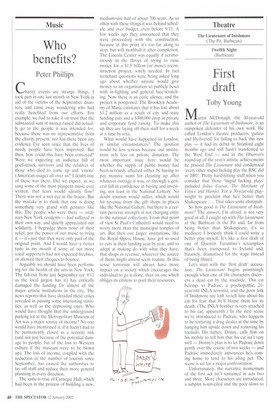Who benefits?
Peter Phillips
Charity events are strange things. I took part in one last month in New York in aid of the victims of the September disasters, and came away wondering who had really benefited from our efforts. For example, we had to take it on trust that the substantial sum of money raised did actually go to the people it was intended for, because there was no representative from the charity present, nor has there been any evidence I've seen since that the lives of needy people have been improved. But then, how could this have been conveyed? Were we expecting an audience full of grief-struck survivors and the relatives of those who died to come up and 'emote' (American usage) all over us? I doubt one of these was there. Did we expect, as we sang some of the most plangent music ever written, that tears would silently flow? There was not a wet eye in the house. But the mistake is to think that one is doing something very grand with gestures like this. The people who were there — ordinary New York residents — had suffered in their own way, and quietly appreciated our solidarity. I begrudge them none of their relief, nor the power of our music to bring it — it's just that they were only part of the original point. And 1 would have a better taste in my mouth if some of our more vocal supporters had not expected freebies, or allowed their cheques to bounce.
Arguably we should have been performing for the health of the arts in New York. The fall-out from last September (or 9/11 as the local jargon has it) has critically damaged the funding for almost all the major artistic institutions in the city. The news reports that have detailed these crises revealed in passing some interesting statistics, as well as the depressing ones. Who would have thought that the underground parking lot at the Metropolitan Museum of Art was a major source of income? No one would have mentioned it, if it hadn't had to be permanently closed as a security risk (and not just because of the potential damage to people, but of the loss to Western culture if the museum were to be blown up). The loss of income, coupled with the reduction in the number of tourists since September, has caused the authorities to lay off staff and reduce their more general planning in every direction.
The same is true of Carnegie Hall, which had been in the process of building a new, medium-size hall of about 700 seats. As so often with these things it was behind schedule and over budget, even before 9/11. A few weeks ago they announced that they were proceeding with the construction, because at this point it's too far along to stop, but will mothball it after completion. The Lincoln Center was equally if acrimoniously in the throes of trying to raise money for a $1.5 billion (or more) reconstruction project, sorely needed. In fact trenchant questions were being asked long ago about whether anyone would give money to an organisation so publicly beset with in-fighting and general face-scratching. Now there is an eerie silence, and the project is postponed. The Brooklyn Academy of Music estimates that it has lost about $1.2 million as a result of city and state funding cuts and a $300,000 drop in private and corporate fund raising. To make this up they are laying off their staff for a week at a time by rota.
What would have happened in London, in similar circumstances? The position would he less serious because our institutions rely less on private donation. The most important issue here would be whether the supply of public money had been seriously affected either by having to pay massive sums for cleaning up after whatever outrage it was, or through a general fall in confidence in buying and investing, not least in the National Lottery. No doubt tourism would suffer, which would hit revenue from the gift shops in places like the National Gallery, but there is a certain perverse strength in not charging entry to the national collections. From that point of view St Paul's Cathedral would need to worry more than the municipal temples of art. But then our larger institutions, like the Royal Opera House, have got so used to cuts in their funding year by year, and so adept at making do with what they have, that drops in revenue, whatever the source of them, might almost seem routine. In this sense terrorism will always have more impact on a society which encourages the individual to go it alone, than on one which obliges its citizens to pool their resources.


























































 Previous page
Previous page